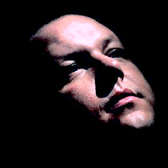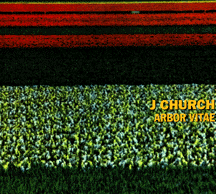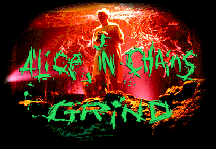

[ Metro | Metroactive Central | Archives ]
Audiofile
Frank Black
Frank Black, the pudgy pop of noise-pop, loves science fiction. Flying saucers and parallel universes have pockmarked his works dating back to the days when he fronted the Pixies. Teenager of the Year (1994), a subterranean hit out of left field, was a further refinement of Frank's addiction to edgy stargazing. Thus, it is not really surprising that his American Recordings debut, Cult of Ray, is loosely based on sci-fi scribe Ray Bradbury's work. Less complex than Teenager of the Year, the new album is no less cool or quirky. The songs here are stripped of artifice, with the exception of a few snatches of eerie sounds. Essentially, this is just a boy and his guitar banging out a batch of slam-jams for our listening enjoyment. An unabashed classicist, Black's got no problem quoting licks from the past; "The Dance War" comes barreling at you like a bastard son of the Beach Boys and the Ramones. (Black will perform at the Edge in Palo Alto on April 28.) (Nicky Baxter)
J Church
An online chat about J Church reminded me to play this album again. I'd initially burned out on J Church's singles and B-sides compilation, Nostalgic for Nothing, and wasn't capable of addressing the group's newest, cleanest, possibly best recording yet. Glad I took this long. Much of Arbor Vitae gathers together a lot of Hüsker Dü's arching shudders and mood swings while injecting a distinct strain of mental thumb-wrestling. "Cigarettes Kill" is accentuated by innocent keyboards and Flip Your Wig-type vocal layering. "Racked," "Drinking Down" and "Church on Fire" describe the thinking-person's hangover in a trilogy of intelligent pop lyrics: "The next morning I was racked with an all-consuming feeling of regret/Vague memories of tragedies/Dionysian polemics/emphasized by my splitting headache." "Disposed to Femininity" may be the best J Church song ever. Listened to as a whole, Arbor Vitae tells a coherent story of desperation and desolation using new musical additions like keyboards and female backup vocals. Is J Church reintroducing the rock-opera format? Not like the Who's Tommy, but more like the Jam's Setting Sons. Maybe I'm reaching, but judge for yourself; it's brilliant either way. (Todd S. Inoue)
Alice in Chains
The members of Alice in Chains have barely survived the lives they sing about. Songs addressing narcotics addiction, near psychosis and general depression have long been this nuevo-metal band's favorite killing floor. Like past releases, Alice in Chains brings the pain forward with a kind of morbid obsessiveness. Singer Layne Staley sounds as if he's been released from detox a week or two too soon. Summoning up thick, pasty slabs of rattles and groans from his guitar, Jerry Cantrell plods along wearily. "Grind," the album's jump-off track, begins the album's descent, and from that point on, the downward spiral never ends. "Sludge Factory" lives down to its promise, with its nether worldly vocals and night-stalker chords and Cantrell's descending, double-octave fretwork. Even when things appear to lighten up (the Beatle-ish "Heaven Beside You"), the mood is shafted by ominous shadows. In the end, Alice in Chains' unremitting fatalism is not something you wanna wake up to. Listen long enough, you may not want to wake up at all. Ever. (NB)
[ Metro | Metroactive Central | Archives ] This page was designed and created by the Boulevards team.

The Cult of Ray
American

Arbor Vitae
Honeybear

Alice in Chains
Columbia
From the April 18-24, 1996 issue of Metro
Copyright © 1996 Metro Publishing and Virtual Valley, Inc.